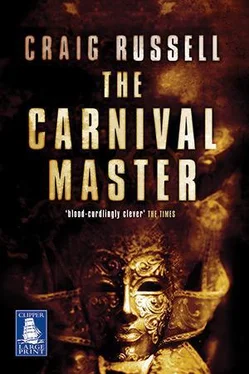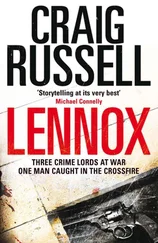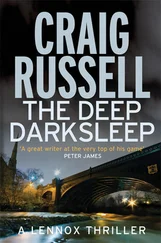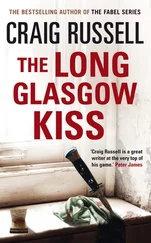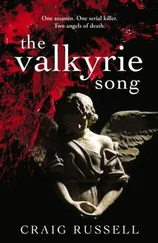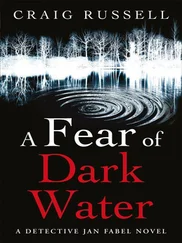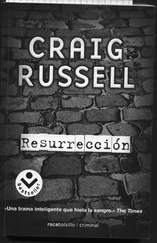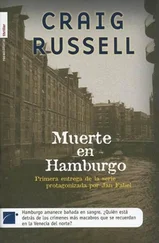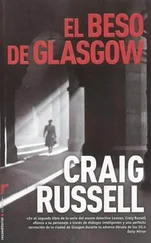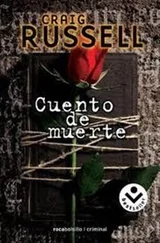Craig Russell - The Carnival Master
Здесь есть возможность читать онлайн «Craig Russell - The Carnival Master» весь текст электронной книги совершенно бесплатно (целиком полную версию без сокращений). В некоторых случаях можно слушать аудио, скачать через торрент в формате fb2 и присутствует краткое содержание. Жанр: Триллер, на английском языке. Описание произведения, (предисловие) а так же отзывы посетителей доступны на портале библиотеки ЛибКат.
- Название:The Carnival Master
- Автор:
- Жанр:
- Год:неизвестен
- ISBN:нет данных
- Рейтинг книги:3 / 5. Голосов: 1
-
Избранное:Добавить в избранное
- Отзывы:
-
Ваша оценка:
- 60
- 1
- 2
- 3
- 4
- 5
The Carnival Master: краткое содержание, описание и аннотация
Предлагаем к чтению аннотацию, описание, краткое содержание или предисловие (зависит от того, что написал сам автор книги «The Carnival Master»). Если вы не нашли необходимую информацию о книге — напишите в комментариях, мы постараемся отыскать её.
The Carnival Master — читать онлайн бесплатно полную книгу (весь текст) целиком
Ниже представлен текст книги, разбитый по страницам. Система сохранения места последней прочитанной страницы, позволяет с удобством читать онлайн бесплатно книгу «The Carnival Master», без необходимости каждый раз заново искать на чём Вы остановились. Поставьте закладку, и сможете в любой момент перейти на страницу, на которой закончили чтение.
Интервал:
Закладка:
Ansgar’s face was now sheathed in a film of sweat. He fought and fought to banish the images that surged into his mind. Those twisted, delicious images in which the chaos he had regulated from his life reigned. Those sweet, sick, perverted ideas that he had forbidden himself. And she was part of them. She was there, always, in those scenarios of tender, succulent flesh and biting teeth. He chewed the meat, unable to swallow. Ansgar Hoeffer thought of the sensual feel of the food in his mouth and again of the girl at work. He shuddered as he ejaculated into his trousers.
3.
It took Fabel four hours to go through the bureaucracy of death: all the form-filling and debriefings that gave Aichinger’s senseless actions some kind of official shape. As he had so many times in his career, Fabel had stood at the heart of a human tragedy, burned by its raw emotional heat, only to go on to play his part in turning it into a cold, sterile statistic. But he would never forget Aichinger’s final expression of sad gratitude. And he doubted if he would ever understand it.
Fabel sat on the edge of the table in the Murder Commission squad room on the third floor of the Police Presidium, Hamburg’s police headquarters, drinking vending-machine coffee. Werner Meyer, Anna Wolff and Henk Hermann were all there: the team that, after fifteen years of leading, he would soon be leaving. Only Maria Klee was conspicuous by her absence. She had been on extended sick leave for the last month and a half: Fabel was by no means the only one who had been marked by the last three major investigations.
He sighed wearily and looked at his watch. He had been forced to hang around because his boss, Criminal Director Horst van Heiden, had asked to see him once he was through with the form-filling and the internal review questions.
‘Well, Chef…’ Senior Criminal Commissar Werner Meyer, a thickset man in his fifties with a grizzly bristle-cut, raised his coffee cup as if it were a glass of champagne. ‘I have to admit, you like to go out in style.’
Fabel said nothing. The images of what had waited for him in Aichinger’s living room still buzzed around his head. The emotions, too. The dread and the hope that had flashed through his mind and had tightened his chest as he had sprinted along the short apartment hall.
‘You did well, Chef,’ said Anna Wolff. Fabel smiled at her. Anna still looked nothing like a Criminal Commissar in the Murder Commission. She was small and pretty and more youthful-looking than her twenty-nine years; her dark hair was cut short and spiky and her full lips were deep red.
‘Did I?’ Fabel asked joylessly. ‘I failed to disarm a mentally fragile man before he blew his brains out.’
‘You lost one,’ said Werner. ‘One that was lost before you even arrived… but you saved four.’
‘How is Aichinger’s family?’ asked Anna.
‘They’re fine. Physically, at any rate. But they’re in deep shock. The shots the neighbours heard had been fired into the ceiling… and thank God that there wasn’t anyone in the apartment above at the time.’ Fabel had found Aichinger’s wife, his seven-year-old daughter, his two boys, nine and eleven. Aichinger had tied them up and gagged them with parcel tape. Fabel would never know if Aichinger had done so to keep them safe, or for execution later. ‘It’s the little girl who’s taking it the worst. Kids see the world so simply. When she woke up this morning, everything in her life was the way it should be. Tonight her world has been turned on its head.’ Fabel paused as he realised he had just echoed Aichinger’s own words. ‘How do you explain what happened to a child of that age? How is she going to live with that memory?’
‘The main thing is that she is going to live with it.’ Werner sipped his coffee. ‘They all are. If you hadn’t kept Aichinger talking, they might all have ended up dead.’
Fabel shrugged. ‘I don’t know…’
The phone ringing interrupted Fabel. Werner answered it. ‘You’re summoned to the fifth floor…’ he said with a grin as he hung up. The fifth floor of the Polizei Hamburg Police Presidium was where all the top-brass offices were, including the Presidial Department. Fabel grimaced.
‘I better answer the call, then…’
4.
Taras Buslenko already knew where the meet would take place, if Sasha’s intelligence was correct. But, of course, they didn’t know that: they would run him all over Kiev before revealing his final destination and he would have to jump through all their hoops.
When the call came on his cellphone, Buslenko had been told at first to head for the Hotel Mir in Goloseevsky Prospekt and to wait in the car park. He’d been there ten minutes when a second call told him to head back to the city centre, park in the Kyivsky Passage and start walking down Khreschatyk Street.
It was a Saturday evening: Khreschatyk Street was closed to traffic every weekend, allowing shoppers and tourists by day and clubbers by night the freedom to wander along it and appreciate its grandeur. Buslenko himself, as he made his way down the vast boulevard, couldn’t help but think how beautiful it looked still laced with glittering Christmas lights. There had been a fresh but light fall of snow and the wide thoroughfare and the trees that lined it looked sugar-dusted in the crisp winter night. As he had been clearly instructed, Buslenko walked in the opposite direction from Independence Square. He had been there in November and December 2003. He had thrilled then at the sight of the orange banners, the air electric with the promise of change. He had felt part of something huge. Unstoppable. However, Buslenko had not been there to lend support: he had been in charge of a detachment of security troops ordered to the square, supposedly to prevent bloodshed between the ‘Blue’ supporters of Yanukovych and the ‘Orange’ revolutionaries supporting Yuschenko. The truth was more likely that they had been sent as a show of regime strength, but the police and intelligence chiefs had recognised a true turning of the tide and many within the security services, like Buslenko, were sympathetic to the Revolution. Buslenko’s detachment had been stood down.
Buslenko made sure he walked past the Celestia nightclub without a glance. Maybe Sasha really had got it wrong. Or maybe the people he was supposed to be meeting were just being over-cautious.
He had almost reached the Central Universal Mall when his phone rang again. This time he was instructed to wait at the bar of the Celestia nightclub. Buslenko felt relieved. He had started to worry that he might be redirected to some more remote part of Kiev. The Celestia was good. Right in the heart of the city. More public. More difficult if you wanted to kill someone and dispose of a body.
The Celestia was one of the glittering symbols of the new Ukraine’s aspirations: a glitzy place in Kiev city centre at the Independence Square end of Khreschatyk Street. Buslenko, despite his background, remained a solid supporter of Ukraine’s new path: he had always been a patriot and now he saw the potential for the future that his country deserved. His heart had been with the Orange Revolution but places like the Celestia made him feel uncomfortable: they sought to reflect Western affluence and glamour, but something about them struck Buslenko as sham and borrowed, like seeing a ruddy-cheeked peasant girl in an over-glittery cocktail dress and inexpertly applied make-up.
There were two black-suited doormen outside the club. One was bull-necked and mutely massive; the second was smaller, leaner and friendlier, smiling at Buslenko as he held the door open. As he had been trained to do in every situation, Buslenko automatically assessed the risk the doormen presented. In a time too brief to be measured, he identified the smaller man as the main danger: he moved quickly and easily and hid whatever he was thinking behind a smiling mask. Buslenko recognised that the smaller man, unlike the cumbersome bodybuilder, would be capable of fast and lethal violence. A killer. Probably with a Spetsnaz background.
Читать дальшеИнтервал:
Закладка:
Похожие книги на «The Carnival Master»
Представляем Вашему вниманию похожие книги на «The Carnival Master» списком для выбора. Мы отобрали схожую по названию и смыслу литературу в надежде предоставить читателям больше вариантов отыскать новые, интересные, ещё непрочитанные произведения.
Обсуждение, отзывы о книге «The Carnival Master» и просто собственные мнения читателей. Оставьте ваши комментарии, напишите, что Вы думаете о произведении, его смысле или главных героях. Укажите что конкретно понравилось, а что нет, и почему Вы так считаете.
